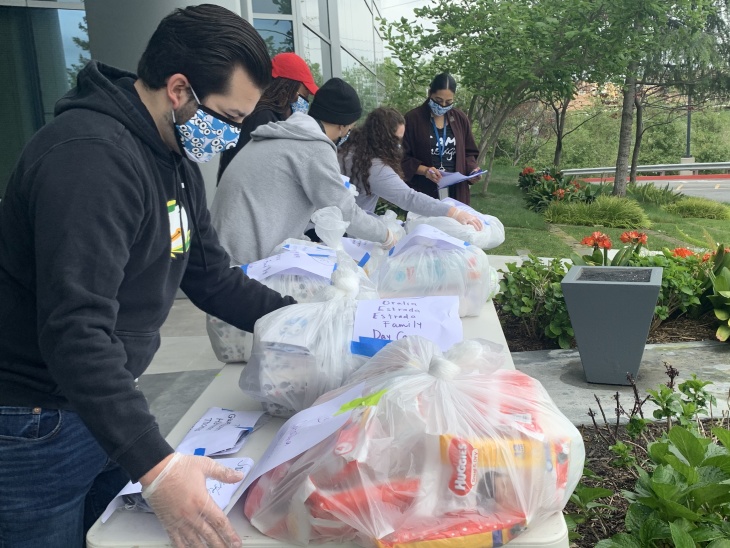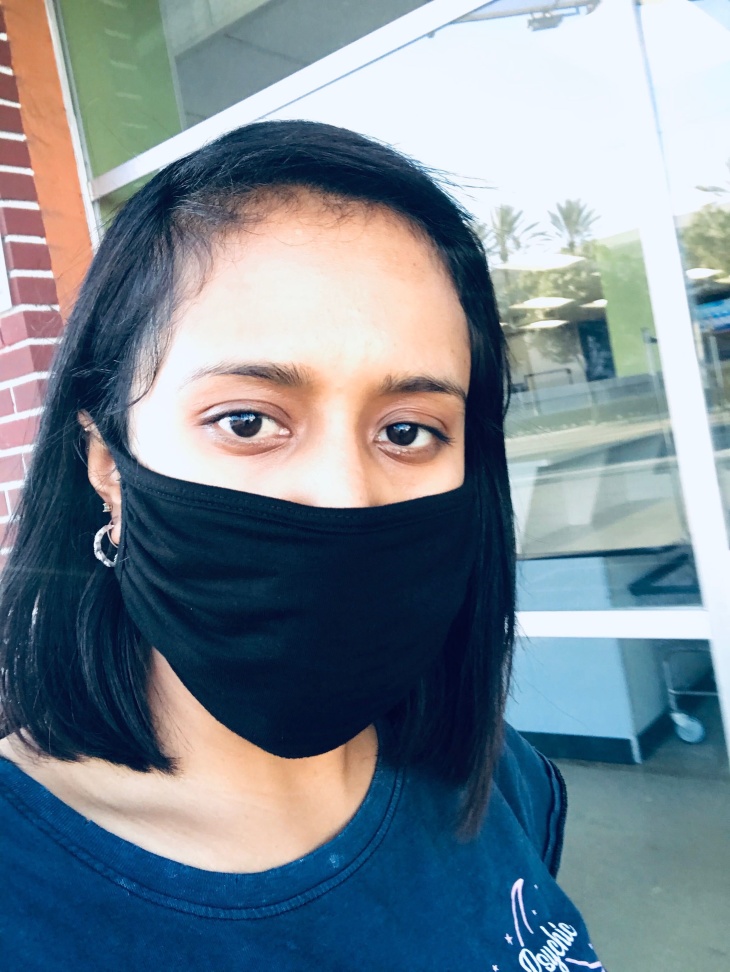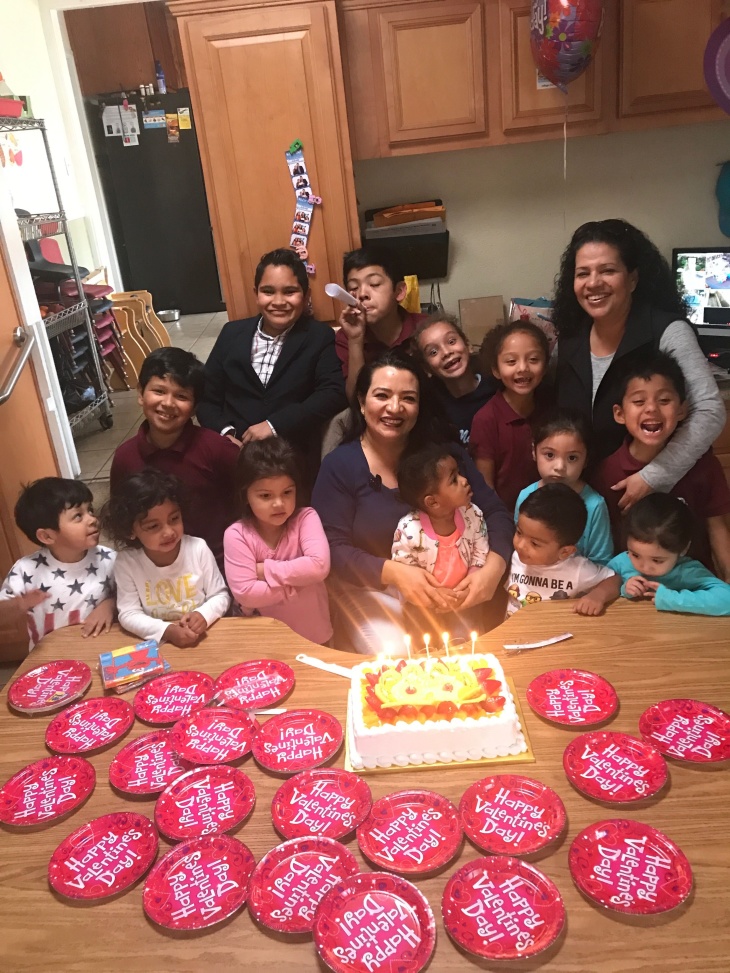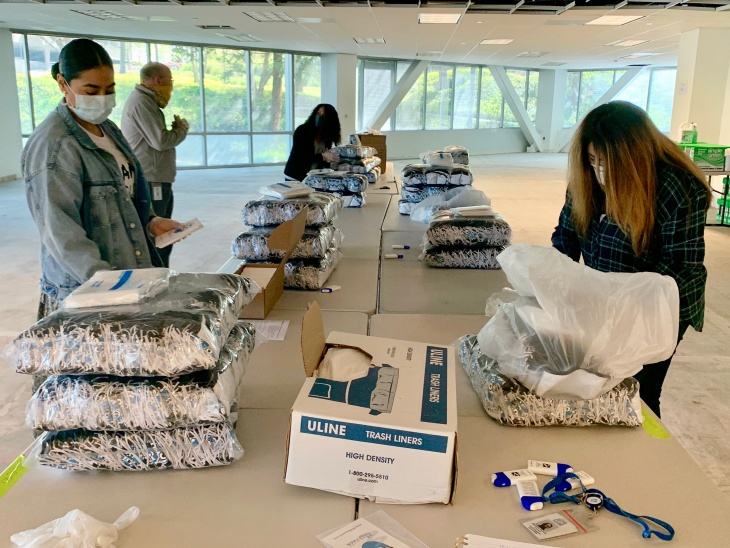
Our news is free on LAist. To make sure you get our coverage: Sign up for our daily coronavirus newsletter. To support our non-profit public service journalism: Donate Now.
Under an executive order signed on April 4 by Governor Gavin Newsom, tens of thousands of essential workers in California are eligible for subsidized child care. And on Tuesday, Newsom said he'd like to see child care access expanded as retail businesses reopen in the next few weeks.
"Child care is foundational to getting people back to work," Newsom said. "If they cannot get the kind of quality child care that they deserve they are less likely to get back to work and jump start this economy."
As local and state leaders rush to create new ways for essential workers to access child care, questions about how they'll deliver services remain unanswered.
Are there enough child care providers for all of the parents — essential workers and otherwise — who need someone to look after their kids? For those lucky enough to find one, will Newsom's promised subsidies arrive fast enough and last long enough to meet the overwhelming demand?
As of April 23, 66% of L.A. County's licensed preschools and child care centers had closed, according to the state's department of social services. The majority of home day care providers remain open, though the number of children in their care has dropped. Many of them say promised supplies — to be paid for out of a state fund — have yet to appear, making it more difficult for them to continue operating.
PARENTS' STRUGGLES

There are an estimated 305,000 California children whose parents work in health fields and could need care, according to researchers at Colorado State University and Yale.
One of those parents is Dr. Ritu Jain Viswanath, an internist who has a 2-year-old son and is in her third trimester of pregnancy.
She and her husband, who's also a doctor, decided to send their nanny home with pay, pull their son from day care in March (it's since closed) and forgo the help of their parents to protect them from possible exposure to COVID-19.
"Am I doing the right thing? Is it okay for me to be working?" Viswanath asks herself daily. "Am I going to potentially cause harm to my child or to my unborn child?"
For now they're juggling child care between shifts at the hospital, but Viswanath said she and her husband could need more help when their second child is born in a few weeks.
"You recognize the importance of the village when you especially don't have one," Viswanath said.
Outside of health care, essential workers include first responders, law enforcement officers, and grocery workers like Karla Barrera. She works as a manager in the deli department at a Sun Valley Ralph's grocery store.
"I cashier, I bag. We just jump in together to help, but lately it's been a little difficult," Barrera said.

Her 6-year-old son's school, Liggett Elementary, is closed and, like Dr. Viswanath, she doesn't feel comfortable having her mom babysit her 4-year-old daughter.
"I already knew I was exposing them day by day by dropping them off with them, picking them up after," Barrera said.
So for the last several weeks, she's been on unpaid leave, staying at home to care for her kids.
For these essential workers, finding affordable child care can be a full-time job in itself.
WHO CAN PROVIDE CHILD CARE?
According to the state, as of April 23, about 700 L.A. County child care centers and 5,600 licensed providers who take care of children in their homes remained open.
L.A. County essential worker parents can go online or call a hotline, 888-922-4453 (888-92CHILD) to connect to an agency that will help them find child care.
"There's a database that sits on one side and then there's the actual people that are doing the care and sometimes you need a link to connect those two," said Eileen Friscia, the resource and referral director at the Child Care Resource Center.
Parents provide information about the type of care they need and the center identifies possible providers and checks with them for open spots.
"Once we know for sure, we give that information back to the parents so that they don't have to do those extra time-consuming steps," Friscia said.
The center is prioritizing hospital workers, Friscia said, but will try to find a child care provider for any essential worker family that calls.
Even if parents can find an open provider, the cost can be prohibitive.
On April 10, Governor Newsom announced an additional $50 million to fund child-care subsidies for providers.
Typically these are reserved for low-income families. The new aid will also be available for those with essential jobs.
The money will help pay for the care of an estimated 20,000 kids.
But the demand is potentially much higher. The Child Care Resource Center alone already had more than 22,000 families on its waiting list for financial assistance and 1,564 people have applied for the subsidized spots since applications opened last Thursday.
"There will still be many, many, many families left out of child care struggling to piece together child care because they can't afford it," said Keisha Nzewi, public policy director at the California Resource and Referral Network, a statewide association of child care agencies.
Even before coronavirus, one analysis found 6% of L.A. County babies and toddlers had access to subsidized care while 51% qualified financially.
California is now expediting a statewide database of child care providers in the works for years. It had been scheduled to launch this summer.
"Parents need access to be able to easily find child care now," Nzewi said.
To get information in one place about whether providers are open or closed as well as location and hours is a huge task
The California Department of Education did not answer LAist's question about when parents will be able to access the site.
OPTIONS FOR HOSPITAL WORKERS
The city of L.A. has also created several options for hospital workers.
Employees at 11 hospitals can apply for $100 stipends to help pay for child care or drop their kids off at one of eight L.A. Department of Recreation and Parks centers where city staff will watch them. Each hospital's human resources department helps employees make the arrangements.
In the first week of the program, 364 families used the stipends, according to the L.A. mayor's office. Two families have registered for child care at the city recreation centers.
(Map reflects hospital and child care center information provided by the City of L.A. )
'NO SUPPLIES'
Newsom also promised $50 million for cleaning supplies for providers who are trying to stay open to take care of essential worker families.
Neither supplies nor cash have made it to providers like Sylvia Almaraz, who runs a 24-hour home day care in Los Angeles. She's facing bare store shelves and limits on groceries like milk.

"They needed us so bad, so bad, and up to now, no supplies," Almaraz said. "No gloves, no masks no Lysol, no sanitizer, no nothing."
She prefers Lysol wipes and disinfectant sprays, but now buys whatever stores have in stock, whether it's bleach or rubbing alcohol.
Now, she cares for about six children every day, less than half her usual attendance, but that doesn't mean there's less work.
"When they come in in the morning we have to clean their shoes," Almaraz said. "We have to sanitize their clothes, wash their hands, take off their masks, clean off their faces."
Almaraz says she's willing to enroll the children of essential workers, but she's also worried about having enough supplies to keep her home and the kids clean and safe.
"We were there for all of these families and we didn't close, we said 'OK they need, us we're here,'" Almaraz said.
L.A.'s child care resource and referral agencies are collecting and providing supplies when possible. Their distribution events reach a few hundred providers at a time when there are thousands of family child care homes in need.
Crystal Stairs recently loaded diapers, cloth masks and other supplies straight to the cars of about 150 providers.

Options for Learning delivered diapers to a provider in Whittier who continues to serve children of essential workers and packets of activities to families whose children are at home.
The Child Care Resource Center, where Friscia works, doled out children's books, granola bars and 35,388 diapers on April 18.
"This has highlighted (providers) can't be on their own, they need support to stay open," Friscia said.
LAist reporter Elly Wu contributed to this story.
"care" - Google News
April 29, 2020 at 08:00PM
https://ift.tt/2KFLxqK
More Than Half Of LA Child Care Centers Closed. Who Is Watching The Kids Of Essential Workers? - LAist
"care" - Google News
https://ift.tt/2N6arSB
Shoes Man Tutorial
Pos News Update
Meme Update
Korean Entertainment News
Japan News Update
Bagikan Berita Ini














0 Response to "More Than Half Of LA Child Care Centers Closed. Who Is Watching The Kids Of Essential Workers? - LAist"
Post a Comment